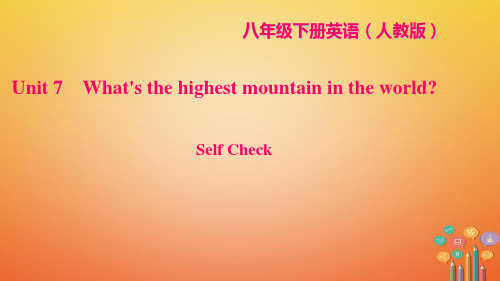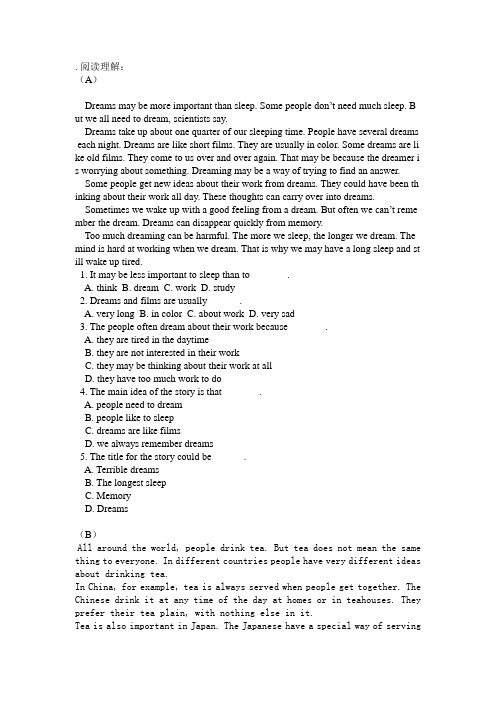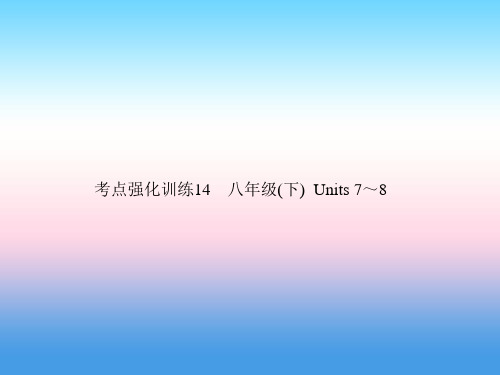八年级(下)英语完形填空课件
- 格式:pptx
- 大小:218.92 KB
- 文档页数:9


. 阅读理解:(A)Dreams may be more important than sleep. Some people don’t need much sleep. B ut we all need to dream, scientists say.Dreams take up about one quarter of our sleeping time. People have several dreams each night. Dreams are like short films. They are usually in color. Some dreams are li ke old films. They come to us over and over again. That may be because the dreamer i s worrying about something. Dreaming may be a way of trying to find an answer.Some people get new ideas about their work from dreams. They could have been th inking about their work all day. These thoughts can carry over into dreams.Sometimes we wake up with a good feeling from a dream. But often we can’t reme mber the dream. Dreams can disappear quickly from memory.Too much dreaming can be harmful. The more we sleep, the longer we dream. The mind is hard at working when we dream. That is why we may have a long sleep and st ill wake up tired.1. It may be less important to sleep than to _______.A. thinkB. dreamC. workD. study2. Dreams and films are usually ______.A. very longB. in colorC. about workD. very sad3. The people often dream about their work because _______.A. they are tired in the daytimeB. they are not interested in their workC. they may be thinking about their work at allD. they have too much work to do4. The main idea of the story is that _______.A. people need to dreamB. people like to sleepC. dreams are like filmsD. we always remember dreams5. The title for the story could be ______.A. Terrible dreamsB. The longest sleepC. MemoryD. Dreams(B)All around the world, people drink tea. But tea does not mean the same thing to everyone. In different countries people have very different ideas about drinking tea.In China, for example, tea is always served when people get together. The Chinese drink it at any time of the day at homes or in teahouses. They prefer their tea plain, with nothing else in it.Tea is also important in Japan. The Japanese have a special way of servingtea called a tea ceremony. It is very old and full of meaning. Everything must be done in a special way in the ceremony. There is even a special room for it in Japanese homes.Another tea-drinking country is England. In England, the late afternoon is “teatime”. Almost everyone has a cup of tea then. The English usually make tea in a teapot and drink it with milk and sugar. They also eat cakes, cookies and little sandwiches at teatime.In the United States people drink tea mostly for breakfast after meals. Americans usually use tea bags to make their tea. Tea bags are faster and easier than making tea in teapots. In summer, many Americans drink cold tea—“iced tea”. Sometimes they drink iced tea from cans, like soda.( ) 1. The passage is about ___.A.why tea is importantB.the teatime in EnglandC.different ways of drinking teaD.Chinese tea( ) 2. Tea is popular ___.A.all around the worldB.only in the United StatesC.only in English-speaking countries.( ) 3. The Chinese drink tea ___.A.for breakfastB.at any tie only if they want to drinkC.only in teahousesD.in a special ceremony( ) 4. The English like to ___.A.drink their tea in a special roomB.have tea with dinnerC.eat cakes and cookies with their teaD.drink their tea plain( ) 5. Iced tea is popular ___.A. in winterB. in EnglandC. for breakfastD. in the United StatesCThe best way of learninga language is using it. The best way of learning English is talking in English as much as possible. Sometimes you’ll get your words mixed up(混合) and people won’t understand you. Sometimes people will say things too quickly and you couldn’t understand them. But if you sense of humor (幽默感), you can always have a good laugh at the mistakes. It’s better for people to laugh at your mistakes than to be angry with you, because they don’t understand what you are saying. The most important thing for learning Englishis :” Don’t be afraid of making mistakes because everyone makes mistakes.”( )1. The writer thinks that the best way for you to learn a language is _____A. writing itB. using itC. listeningD. learning grammar( )2. What should you do in learning English?A. Be careful not to make any mistakesB. Write as quickly as you canC. Speak English as much as you canD. Laugh more often( )3. When people laugh at your mistakes, you should _____A. not careB. be happyC. feel worriedD. be unhappy( )4. When you make s mistake, you should ______A. keep quietB. get angryC. be kindD. keep your sense of humor( )5. The story tells us :“______”.A.Only foolish(愚蠢) people make mistakesB.Few people make mistakesC.People never make mistakesD.There is no one who doesn’t make mistakesDOnce an old man went to see a doctor. The doctor looked him over carefully and said,“Medicine won’t help you. You must have a good rest. Go to bed early, drink milk, walk a lot and smoke one cigar(雪茄烟) a day. Go to the country place for a month.”After a month the man came to the doctor again,“How are you?” said the doctor. “I’m glad to see you again. You look much younger”“Oh, doctor! I feel quite well now,” said the man “ I had a good rest. I went to bed early, drank a lot of milk and walk a lot. Your advice certainly helped me, but that you told me to smoke one cigar a day almost killed me first.”( )1. The doctor told the man _____A. to go to bed earlyB. to drink milkC. to walk a lotD. all above ( )2. Which of the following sentences is true?A.The doctor told the man to visit a beautiful city of the country for amonth.B.The doctor didn’t tell him what to do.C.After a month, the old man felt better.D.The old man was younger than before after a month.( )3. The doctor’s words were _____ for the old man’s health.A. uselessB. goodC. well oreC. to help himD. to start smoking( )4. From what the old man said at last, we think ______A.one cigar a day was really helpful to himB.one cigar a day was better than beforeC.he didn’t understand the doctor’s adviceD.smoking made him feel better than before一.完形填空(10分):When Mr Smith retired(退休), he bought a small 1 in a village near the sea. He2 it and hoped to live a quiet life in this house.But to his great surprise, many tourists came to see his house in summer holidays, for it was the most 3 building in the village. From morning to night there were 4 outside the house. They kept looking into the rooms through the windows and 5 of them even went into Mr Smith’s garden. This was too much for Mr Smith. He decided to ask the visitors to 6 . So he put a notice on the window. The notice said, “If you want 7 your curiosity(好奇心),come in and look round. Price: twenty dollars.” Mr Smith was sure that the visitors would 8 coming, but he was wrong. More and more visitors came and Mr Smith had to 9 every day showing them around his house.“I came here to 10 not to work as a guide(导游),”he said angrily. In the end, he sold the house and moved away.()1.A. garden B. shop C. house D. school()2. A. liked B. hated C. sold D. built()3. A. big B. interesting C. small D. clean()4. A. children B. students C. parents D. tourists()5. A. no B. none C. many D. much()6. A. come B. leave C. stay D. play()7. A. to satisfy B. satisfy C. to satisfying D. satisfying ()8. A. go on B. stop C. continue D. not()9. A. take B. cost C. spend D. pay()10. A. play B. work C. watch D. retire二.完形填空(共10小题,每小题1分,满分10分)通读下面短文,掌握其大意,然后在31-40题所给的A、B、C、D四个选项中,选出一个最佳答案。




人教版八年级下册英语完形填空练习题(含答案)XXX XXX over the sick man。
He asked for a pen and some paper to write down the name of the medicine。
But there was no pen or paper in the village。
because no one could write.The doctor picked up a piece of burnt wood from the fire and wrote the name of the medicine on the door of the house。
"Get this medicine for him," he said。
"and he will soon get well." Mark's family and friends did not know what to do。
They could not read the strange words。
Then a young man had an idea。
He took off the door of the house。
put it on his carriage XXX。
and Mark was soon well again.1.D (die)2.B (later)3.C (The doctor)4.A (and)5.A (picked)6.D (door)7.A (well)XXX XXX would not survive。
so they called a doctor。
After two days。
the doctor arrived and examined Mark。
He asked for a pen and paper to write down the name of the medicine。